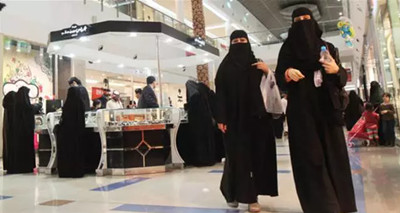沙特阿拉伯的女人們
One step forward, one step back
進一步,退一步
Progress for women is going into reverse under the new king
在新任國王的統治下,女性地位的進步又倒退了
WHEN Hind Al-Otaibi went to the Riyadh Personal Status Court to have her father struck out as her wali, or guardian, the judges seemed sympathetic. Her father had raped and bruised her, Ms Otaibi, who was a teenager at the time, told the court. He refused to let her travel abroad, even to her mother's funeral, and when she escaped from home had persuaded social services to send her back. After consideration, the judges determined last year that her father, an imam from the Saudi interior of Nejd, remained her legal guardian; but that a guardian only had powers to approve his ward's marriage. If upheld on appeal, the ruling could topple the legal edifice of male control, depriving walis of their power over whether their women can study, work, travel or open bank accounts. “Emancipation from slavery,” says Ms Otaibi.
當欣德·奧黛比在利雅得的 Personal Status Court(類似于國內的民事法庭,處理離婚等案件)請求去除父親的斡里或監護人的身份時,法官們似乎很同情。當時還是青少年的奧黛比在法庭上控訴父親強奸并虐待她。她父親拒絕讓她出國,即使是去母親的葬禮也不允許。當奧黛比從家中逃出來時,他父親說服當地社會服務機構將她遣回。她的父親是沙地中部省份內志的一位伊瑪目。在經過慎重考慮之后,去年法官們最終決定保留其父的法定監護人地位。但只是在被監護人的婚姻上擁有監護權。如果法庭支持上訴的話,那么男性控制的法律體系將會顛覆,他們對于女子是否能夠學習,工作,旅游或開戶的決定權將被剝奪。正如奧黛比說的“從奴役中得到解放”。

In recent years, the lot of Saudi women has improved. An increasing number of malls, gated communities and even private beaches, where women swap burqinis (the all-enveloping swimwear Saudi women must wear) for bikinis, were put off-limits to the prying eyes of the religious police. The government sent tens of thousands of women abroad to study in Western universities, where they could experience the freedom of moving, dressing and driving as they pleased. Those left behind could gawp at the gap between their own world and the virtual one to which many Saudis escape for hours every day.
近年來,沙特阿拉伯女性們的命運有了一定的改善。越來越多的商場,封閉式社區甚至一些私人游泳池也規定那些探頭探腦的宗教警察禁止入內,在那里女性可以用比基尼代替全裹泳衣(沙特女性游泳時必須穿的全裹的泳衣)。政府派出了上萬的女性去歐洲大學留學,在那里他們可以享受活動自由,穿著和駕車自由。那些留在國內的女性可以想象自己所處的世界和那些沙特人整日整夜幻想的世界的區別。
Armed with doctorates, many have returned to prize open the job market. In 2012 the courts licensed their first female lawyer. Last December women for the first time stood for election to local councils. Bayan al-Zahran, a lawyer in Jeddah, has set up the first female-led law firm, and law faculties in women's colleges churn out fresh attorneys.
很多擁有博士學位的人回國之后得到就業市場的青睞。2012年法院給第一位女性律師頒發了資格證書。去年12月,婦女們第一次參與到當地委員會的競選當中。吉達的一位律師巴揚·札赫蘭成立了第一家女性領導的律師事務所,女子學院的法律系也培養出了大量的新人律師。
The numbers, though, remain paltry. Only 18% of working-age Saudi women work (against 65% of men), one of the world's lowest rates. And for all the headlines, the kingdom has only 67 female lawyers (out of 3,400), and 21 female councillors (out of 3,150). Female lawyers say they have to contend with judges who tell them to sit down when they stand up to represent clients. But over time the taboos on women in public life seem to fraying. “Women are better at representing other women because women natter more than men, and women understand them better,” says Judge Faisal Orani, fresh from sentencing a whisky-drinker to 80 lashes. He opposes the introduction of female judges, he says, “but over time, anything can change. Maybe I'll change too.”
但這些數字微不足道。只有18%正值工齡的婦女在工作(相比之下,男性有65%),這是世界上女性工作最低的比例之一。而且從各大新聞標題中可以看到,這個國家只有67名女性律師(共有3400名律師),21為女性議員(共有3150名議員)。女性律師說道,當她們需要代表辯護人站起來申訴時,法官卻告訴她們必須坐著,為此女律師不得不與法官作斗爭。但是隨著時間的推移,女性在公眾生活上的一些禁忌似乎漸漸削弱。剛剛判處一名飲威士忌的市民80鞭刑的法官費薩爾·奧拉尼說道:“婦女是代表他們自己的不二人選,因為她們比男人嘮叨,而且她們更了解女人。我反對啟用女法官。但是時間一長任何事情都會改變,也許我自己也會改變。”
The kingdom's joyless gender segregation persists. Banks maintain separate entrances for men and women, Starbucks restricts women from its open-air balcony and McDonald's makes men and women queue separately for its burgers.
這個國家的性別隔離依舊存在。銀行依舊保留著分開的男女通道,星巴克不讓女性坐在露天的陽臺上,到麥當勞排隊買漢堡的男女要分開排隊。












